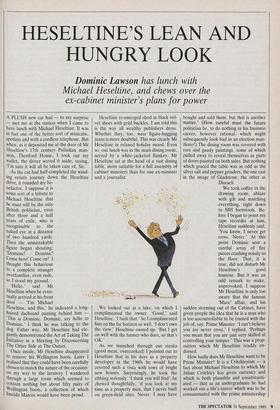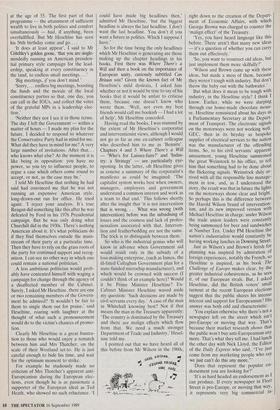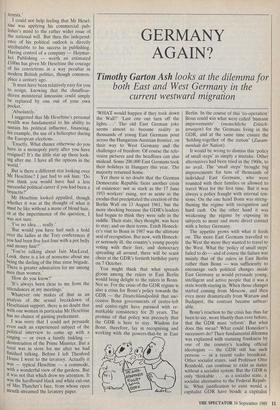HESELTINES LEAN AND HUNGRY LOOK
Dominic Lawson has lunch with
Michael Heseltine, and chews over the ex-cabinet minister's plans for power
A PLUSH new car had — to my surprise
— met me at the station when I came to
have lunch with Michael Heseltine. It was in fact one of the better sort of minicabs, Spotless and with a cordless telephone. But when, as it deposited me at the door of Mr Ileseltine's 17th century Palladian man-
sion, Thenford House, I took out my
wallet, the driver waved it aside, saying, `I'm sure it will all be taken care of, Sir.'
As the car had half-completed the wind- ing return journey down the Heseltine
drive, it rounded my be- nefactor. I suppose it is some sort of a tribute to Michael Heseltine that he must still be the only British politician, even after three and a half years of exile, who is recognisable to the naked eye at a distance of two hundred yards. Then the unmistakable figure began shouting:
'Dominic! Dominic!
Come here! Come on!'
thought this behaviour to a complete stranger overfamiliar, even rude,
so I stood my ground.
`Hello,' said Mr Heseltine when he even- tually arrived at his front door — `I'm Michael Heseltine, and this,' he indicated a long- haired dachsund panting behind him — `This is Dominic. Dominic, say hello to Dominic.' I think he was talking to the dog. Either way, Mr Heseltine had ele- gantly demonstrated the Art of Taking The Initiative in a Meeting by Disconcerting The Other Side at The Outset.
Once inside, Mr Heseltine disappeared to remove his Wellington boots. Later I realised that they could have been carefully chosen to match the nature of the occasion: on my way to the lavatory I wandered through a large room which seemed to Contain nothing but about fifty pairs of Wellington boots, a collection of which Imelda Marcos would have been proud.
Heseltine re-emerged shod in black vel- vet shoes with gold buckles. I am told this is the way all wealthy publishers dress. Whether they, too, wear figure-hugging jeans is more doubtful. This was clearly Mr Heseltine in relaxed holiday mood. Even so, our lunch was in the main dining room, served by a white-jacketed flunkey. Mr Heseltine sat at the head of a vast dining table, more suitable for a full assembly of cabinet ministers than for one ex-minister and a journalist.
We looked out at a lake, on which I complimented the owner. 'Good,' said Heseltine. 'I built that.' So I complimented him on the far horizon as well. 'I don't own the view,' Heseltine owned up. 'But I get on well with the farmer who does, so that's OK.'
As we munched through our steaks (good meat, overcooked) I pointed out to Heseltine that in his days as a property developer in the 1960s he would have covered such a vista with rows of bright new houses. Surprisingly, he took the ribbing seriously. think you will find', he chewed thoughtfully, 'if you look at my time as a property man, that I never built on green-field sites. Never. I may have
bought and sold them, but that is another matter.' (How careful must the future politician be, to do nothing in his business career, however rational, which might subsequently look bad in an election man- ifesto!) The dining room was covered with rare and gaudy paintings, some of which pulled away to reveal themselves as parts of doors painted on both sides. But nothing which graced the table was as odd as the silver salt and pepper grinders, the one cast in the image of Gladstone, the other as Disraeli.
We took coffee in the drawing room, ablaze with gilt and matching everything, right down to MH footstools. Be- fore I began to point my tape recorder at him, Heseltine suddenly said, 'You know, I never get cross. Never.' At this point Dominic sent a careful array of fire pieces crashing noisily to the floor. That, it is true, did not disturb Mr Heseltine's good humour. But it was an odd remark to make, unprovoked. I suppose Mr Heseltine is only too aware that the famous 'Mace' affair, and his sudden storming out of the Cabinet, have given people the idea that he is a man who is too uncontrollable to be trusted with the job of, say, Prime Minister. 'I can't believe you are never cross,' I replied. 'Perhaps you mean that you are just very skilled at controlling your temper.' This was a prop- osition which Mr Heseltine readily en- dorsed.
How badly does Mr Heseltine want to be Prime Minister? It is a Critchleyism — a fact about Michael Heseltine to which Mr Julian Critchley has given currency and which is both plausible and unsubstanti- ated — that as an undergraduate he had worked out a life's career which was to be consummated with the prime ministership at the age of 55. The first part of that programme — the attainment of sufficient wealth to live in both politics and comfort simultaneously — had, if anything, been overfulfilled. But Mr Heseltine has seen his 56th birthday come and go....
'It does at least appear', I said to Mr Critchley's golden goose, 'that you are single- mindedly running an American presiden- tial primary style campaign for the lead- ership, speaking at every constituency in the land, to endless small meetings....'
'Big meetings, if you don't mind.'
'Sorry_ endless big meetings, boosting the funds and the morale of the local constituency parties so that, one day, you can call in the IOUs, and collect the votes of the grateful MPs in a leadership elec- tion.'
'Neither they nor I see it in those terms. The day I left the Government — within a matter of hours — I made my plan for the future. I decided to respond to whatever the Conservative Party had in mind for me. What did they have in mind for me? A very large number of invitations. After that... who knows what else? At the moment it is like being in opposition: you have no power, so you try to influence people, to argue a case which others come round to accept, or not, as the case may be.'
I told Mr Heseltine that nothing he had said had convinced me that he was not running an expensive American style, long-drawn-out run for office. He tried again: 'I reject your analysis. It's true Reagan did something like this after he was defeated by Ford in his 1976 Presidential• campaign. But he was only doing what Churchill did in the 1930s. There's nothing American about it. It's what politicians do if they find themselves outside the main- stream of their party at a particular time. Then they have to rely on the grass roots of the party for continued support and recog- nition. I can see no other way in which one could remain a national politician.'
A less ambitious politician would prob- ably have contented himself with waging a campaign for change through the agency of a disaffected member of the Cabinet. Surely, I asked Mr Heseltine, there are one or two remaining members of the Govern- ment he admired? 'It wouldn't be fair to them to single them out for praise,' said Heseltine, roaring with laughter at the thought of what such a pronouncement would do to the victim's chances of promo- tion.
Clearly Mr Heseltine is a great frustra- tion to those who would enjoy a rematch between him and Mrs Thatcher, on the scale of their Westland set-to. He is just careful enough to bide his time, and wait for the optimum moment to strike.
For example he studiously made no criticism of Mrs Thatcher's apparent anti- Europeanism during the European elec- tions, even though he is as passionate a supporter of the European ideal as Ted Heath, who showed no such reluctance. 'I could have made big headlines then,' admitted Mr Heseltine, 'but the biggest headline is always the last headline. I don't want the last headline. You don't if you want a future in politics. Which I suppose I have.'
So for the time being the only headlines which Mr Heseltine is generating are those making up the chapter headings in his books. First there was Where There's a Will and then a book on the importance of European unity, curiously subtitled Can Britain win? Given the known fact of Mr Heseltine's mild dyslexia, I asked him whether or not it would be true to say of his books that it would be unfair to criticise them, because one doesn't know who wrote them. 'Well, not even my best friends would call me bookish — I had a lot of help', Mr Heseltine conceded.
Having read the books, I was stunned by the extent of Mr Heseltine's corporatist and interventionist views, although I would not go as far as one ex-cabinet colleague who described him to me as 'Bennite'. Chapters 4 and 5 Where There's a Will — 'Who's for Laissez-faire?' and 'Indus- try: a Strategy' — are particularly eye- opening. In the latter, i4r Heseltine gives as concise a summary of the corporatist's manifesto as could be imagined; 'The capitalist system works best when owners, managers, employees and government understand a common interest and work as a team to that end.' This follows shortly after the insight that it is not intervention that is wrong. . . What was wrong (with intervention) before was the subsidising of losses and the cosiness and lack of profes- sionalism associated with that. Interven- tion and featherbedding are not the same. The trick is to distinguish between them.'
So who is the industrial genius who will know in advance when Government aid would result only in the subsidy of a loss-making enterprise, (such as Inmos, the ill-fated Callaghan Government plan for a state-funded microchip manufacturer), and which would be crowned with success (I couldn't think of an example here)? Would it be Prime Minister Heseltine? Ex- Cabinet Minister Heseltine waved aside my question: 'Such decisions are made by civil servants every day.' A case of the man in Whitehall knowing best? Not if that means the man in the Treasury apparently: 'The country is dominated by the Treasury and there are malign effects which flow from that. We need a much stronger Department of Trade and Industry,' Hesel- tine told me.
I pointed out that we have heard all of this before from Mr Wilson in the 1960s, right down to the creation of the Depart- ment of Economic Affairs, with which George Brown was charged to counter the 'malign effect' of the Treasury. 'Yes, you have heard language like this before. There aren't that many new ideas — it's a question of whether you can carry them out effectively.' `So, you want to resurrect old ideas, but just implement them more skilfully?' 'Wilson and Brown came up with these ideas, but made a mess of them, because they weren't tough with industry. But don't throw the baby out with the bathwater.'
But what does it mean to be tough with industry, in the Heseltine style? I think I know. Earlier, while we were slurping through our home-made chocolate mous- se, Heseltine reminisced about his days as a Parliamentary Secretary at the Depart- ment of Transport. The electronic signals on the motorways were not working well. GEC, then in its heyday as bespoke supplier of electrical services to the nation was the manufacturer of the offending items. So, to his civil servants' apparent amazement, young Heseltine summoned the great Weinstock to his office, to tell him that something had to be done about the flickering signals. Weinstock duly ar- rived with all the responsible line manage- ment in tow, and, as I understood the story, the result was that in future the lights on the motorways shone clear and bright. So perhaps this is the difference between the Harold Wilson brand of intervention- ism, and its new improved version with Michael Heseltine in charge: under Wilson the trade union leaders were constantly being summoned for beer and sandwiches at Number Ten. Under PM Heseltine the nation's industrialists would constantly be having working lunches in Downing Street. Just as Wilson's and Brown's fetish for planning was inspired by admiration of foreign experiences, notably the French, so Heseltine is inspired, as his book The Challenge of Europe makes clear, by the greater industrial cohesiveness, as he sees it, of our European rivals. But, I asked Heseltine, did the British voters' small turnout at the recent European elections suggest that the public shares his intense interest and support for Europeanism? His answer was both odd and characteristic: 'You explain otherwise why there's not a newspaper left on the street which isn t pro-Europe or moving that way. That's because their market research shows that the public won't buy anti-Europeanism any more. That's what they tell me. I had lunch the other day with Nick Lloyd, the Editor of the Daily Express who said, "I've just come from my marketing people who say we just can't do this any more."
'Does that represent the popular en- dorsement you are looking for?' 'It's as hard headed an endorsement as I can produce. If every newspaper in Fleet Street is pro-Europe, or moving that Way, it represents very big commercial in- terests.'
I could not help feeling that Mr Hesel- tine was applying his commercial pub- lisher's mind to the rather wider issue of the national will. But then the independ- ence of his political outlook is directly attributable to his success in publishing. Having control of a company — Haymar- ket Publishing — worth an estimated £100m has given Mr Heseltine the courage of his convictions in a way peculiar in modern British politics, though common- place a century ago.
`It must have been relatively easy for you to resign, knowing that the chauffeur- driven ministerial limousine could simply be replaced by one out of your own pocket.'
'Absolutely.'
I suggested that Mr Heseltine's personal wealth was fundamental to his ability to sustain his political influence, financing, for example, the use of a helicopter during the European elections.
'Exactly. What chance otherwise do you have in a monopoly party after you have resigned? It's the little star up there look- ing after me. I have all the options in the world.'
But is there a different star looking over Mr Heseltine? I just had to ask him: `Do You think you would have had a less successful political career if you had been a brunette?'
Mr Heseltine looked appalled, though Whether it was at the thought of what it must be like without a mane of blond hair, or at the impertinence of the question, I was not sure.
Tye no idea... really.'
'But would you have had such a hold over the ladies at the Tory conferences if You had been five foot four with a pot belly and mousy hair?'
'You're talking about lain MacLeod. Look, there is a lot of nonsense about me being the darling of the blue rinse brigade. There is greater admiration for me among men than women.'
'How do you know?'
`It's always been clear to me from the attendances at my meetings.' Whatever one makes of that as an analysis of the sexual breakdown of Heseltinian support, there is no doubt that With one woman in particular Mr Heseltine has no chance of gaining preferment.
I was sorry that I could not persuade even such an experienced subject of the Political interview to come up with a ringing — or even a faintly tinkling — denunciation of the Prime Minister. But a treat was in store for me after we had finished talking. Before I left Thenford House I went to the lavatory. Actually it was — typical Heseltine — a commode, With a wonderful view of the gardens. But It was not that which drew my attention. It was the hardboard black and white cut-out of Mrs Thatcher's face, from whose open mouth streamed the lavatory paper.




































































 Previous page
Previous page